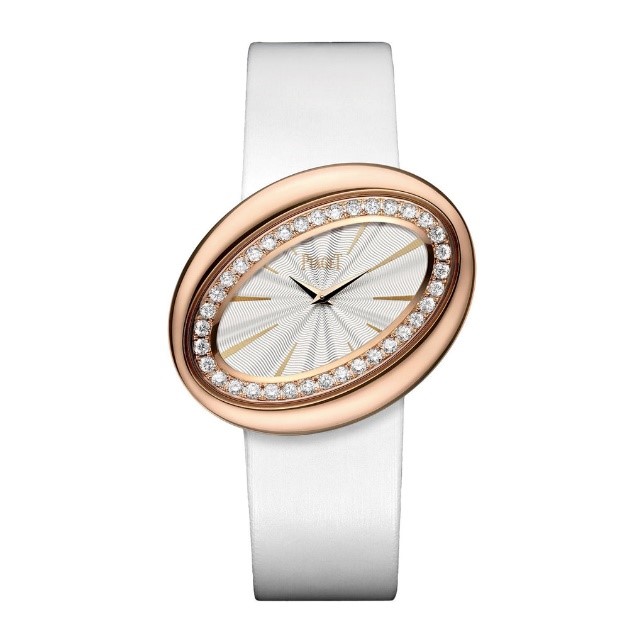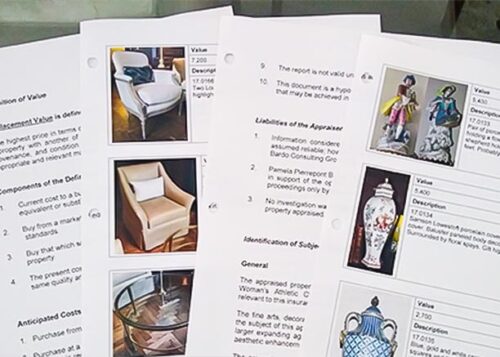
By Pamela Bardo
Our Art & Antiques Editor, Pamela Pierrepont Bardo, believes that our possessions have a life cycle of their own – acquiring, maintaining, and deaccessioning. Here she offers her advice on dealing with these changes. We talked about insurance last month. Now:
…Pamela Tells All About Your Possessions: How Appraisals are Worth Their Weight in Cash!
How is an appraisal valuable? Let me count the ways.
An appraisal is more than just a statement of the monetary value of your objects. An appraisal gives peace of mind. It provides every user with the same information and eliminates folklore and personal bias toward specific possessions. It accounts for everything and establishes ownership, quality, and condition. It can be crucial in a divorce. It assists the police and FBI in the event of property theft. An appraisal is essential in making possible the full value on the insurance claim in the event of theft, damage, or loss. It saves time, money and squabbling for everybody involved if an appraisal was completed before the time of death because it needs only minor changes to the purpose, date, and value—all else is done. When a parent downsizes or moves into an extended-care facility and wants to convert unneeded possessions into cash at full value, an appraisal is a turning point for the concerned family.
For tax and estate planning, your heirs will thank you for taking the stressful and oftentimes angry-making decisions out of their hands. As another benefit, appraisal fees for tax appraisals are tax-deductible to the extent allowed by law.

An example of an Appraisal Report.
Another situation in which qualified appraisals prove worth their weight in cash is after people say, “I don’t want the IRS to have a paper trail when I die.” Sorry, but guess what! The value structure will go down, but everything will have to be appraised anyway unless it is in some kind of legal structure!
Also, property owners often mistakenly believe, “I don’t need an appraisal because I have an alarm system,” or “I have a Doorman 24/7.” Maybe so, but the doorman will not protect them from all unforeseen circumstances. For example, there is the risk of water damage from the pipes above. Water damages one out of four condos annually. And when property owners say, “I’ll use my receipts if I have a loss,” you must remember that, with changes in value, you won’t be able to replace things today for what you paid for them back when. And do all your receipts have all the requisite details to negotiate a replacement of the property today? Nothing costs as much as having the wrong insurance coverage with no appraisal in the event of a catastrophe. Imagine losing out on thousands of dollars because you can’t back up your claim with a solid replacement-value appraisal.
A lady I know lost the unusual gold watch shown below, but since she appraised and insured it correctly, she received a full replacement value of $30,000.

Piaget 18k Gold Limelight Ladies Watch
Last month, I explained the different kinds of insurance. It is important that you combine the scheduled insurance with a proper appraisal to be fully protected. You would not check a mink coat at a restaurant uninsured, but that’s what you’re doing when you leave your Georg Jensen flatware, your sterling silver tea service, and your Picasso print unprotected and unappraised, when you go out to play bridge.
Museum curators can’t appraise by law. Art dealers from whom you purchased a work give a slanted view to protect their reputations and their markets. Auction house appraisers are smart and quick. Often, they offer perks if you consign the property for sale with them. They make their money selling, not appraising. Appraisal services to the auction house is just an enticement. Their knowledge stems from property sold on the auction market. But, what about insurance, charitable donation, division among children, divorce, contested probate, bankruptcy, or income production property?
So, you may ask, what is an accredited appraiser and a qualified appraisal?
The accredited appraiser, with a minimum of a B.A. Degree, takes four rigorous courses given by one of the two national organizations, submits character references, a logbook of the last 5 years of appraisal work experience, passes an Ethics exam, passes the national 15-hour exam, “Uniform Standards of Professional Appraisal Practice,” passes an exam in their subject discipline, as well as submits appraisal reports for review by specialists. These credentials must be kept current through coursework and exams over the course of the appraiser’s practice.
The independent accredited appraiser with this depth of training and who has passed the national level of testing is qualified to perform a certified IRS Family Partnership appraisal, charitable donation to a 501(c)3 institution, testify in court for you, if needed, or mediate a disagreement over a $5 million painting.
As a practical matter, the hourly rate of a fully qualified, professionally accredited appraiser is typically $150 – $300. The fee is tax deductible under certain circumstances. The two organizations that test and certify appraisers of personal property are The American Society of Appraisers, and The Appraisers Association of America.
As always, I am here in Chicagoland, and you are most welcome to email me with a request for a specific need at: ppbardo@bardoappraisals.com
Next month: Learn all about gifting your valuables.







